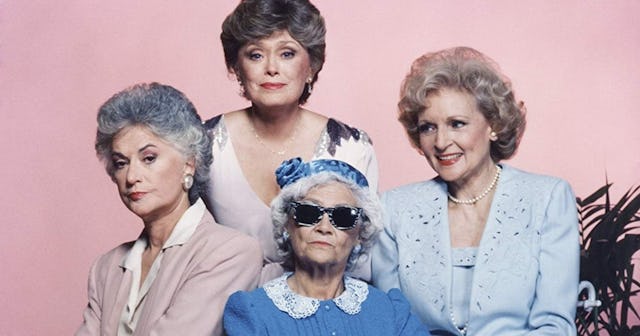Why 'The Golden Girls' Stands The Test Of Time

When you hear the words, “thank you for being a friend,” there’s only one thing you think of. Four sassy women old enough to be your grandma living in Miami. That’s right, you’re thinking of The Golden Girls. The show, which premiered in 1985, is a huge part of our social consciousness — and for good reason. In addition to being incredibly entertaining, The Golden Girls was groundbreaking. That’s precisely why it’s still so popular now, more than 35 years after its premiere.
There aren’t too many subjects The Golden Girls didn’t touch on during their seven seasons — from ageism to marriage equality to AIDS. Back in the late-’80s/early-’90s, many of these subjects weren’t societally acceptable to talk about. Not too many shows were brave enough to go there, let alone sitcoms. Even by today’s standards, most sitcoms aren’t tackling the same heavy issues Dorothy and crew were taking on way back when. The writers weren’t afraid to “go there,” and that’s one of the many reasons the show still stands the test of time.
GIPHY
Of course, one of the most inspiring things the show does is prove that women over 50 are still kicking ass. In a world where youth is the focus and standard, they buck the norm. Each one of them is proof that women don’t have an expiration date — we are more than just our age. They’re out there living their best lives and giving zero fucks about what others think.
Never before had we seen older women who were still sexually active. And not just sexually active, but sexually voracious. The Golden Girls are sexual beings — giving us hope that you don’t shrivel up when you reach middle age. They’re unapologetic in their sexuality, and they never seem to compromise their desires. Blanche is the most perfect example of this, but they all get it in there. Even Sophia, who is an actual octogenarian, has boyfriends and briefly remarries. Their slut shaming of Blanche can get heavy handed, but it’s all in jest at the end of the day.
GIPHY
The Golden Girls never shies away from social issues either. Yes, it’s a sitcom and therefore light and funny. However, they were able to blend the comedy with the serious realities people were facing at the time. These social issues are never presented as a “very special episode” either; they’re simply part of the storyline.
Several episodes on the show feature LGBTQ characters — most notably, Blanche’s younger brother Clayton. Not only does he come out as gay, he also marries his partner. This is something Blanche can’t wrap her head around. “I can accept the fact that he’s gay,” she says to Sophia, “but why does he have to slip a ring on his finger so the whole world will know?” Shockingly, Sophia is the one who makes Blanche realize she’s being totally ignorant.
Dorothy’s brother Phil, who we never see, bucks gender norms. Phil isn’t gay — he’s married with several children. He just likes wearing women’s clothing, especially lingerie. Even though this has been happening his entire life, when he dies, Sophia finally confronts her true feelings about it. She asks his widow why she never stopped “the dress thing,” as if being married could rid him of his desire. Rose helps her realize that Phil’s preferences weren’t something to be ashamed, but were just what made Phil who he was.
The Golden Girls is surprisingly progressive. Their treatment of LGBTQ+ people is probably why the show is so popular within the community. We queers love us some Golden Girls. At a time when the gay community was under intense scrutiny, the show never treated the community as “other.” The LGBTQ characters were simply people. Shows today don’t get it quite as right as the Golden Girls.
GIPHY
This is especially true when talking about the AIDS crisis. The United States government was barely acknowledging it as a real thing, but The Golden Girls took it head on. It was most prominently featured in an episode where Rose has to have an AIDS test years after a blood transfusion. “I’m a good person,” Rose declares in a moment of self pity. “AIDS is not a bad person’s disease, Rose,” Blanche counters. At a time when there was so much misinformation, such a simple statement made a huge impact.
Since it’s a show about older women, ageism is something The Golden Girls deals with several times. More than once, Rose face ageism while searching for a job. When her dead husband’s pension runs out, no one will hire her because she’s a woman over 50. She goes to see a TV consumer reporter about taking on her age discrimination case, only to face discrimination when she asks if she can apply for an assistant job.
GIPHY
There are so many other topics The Golden Girls focuses on. Teenage pregnancy (both through Dorothy and another character), homelessness, prescription pill addiction, suicide, sexual harassment, and elder abuse, to name a few. Then there’s the complexity of adult/child relationships and friendship. As much as they may have their spats, there’s no doubt of how much they love each other. You can tell these women are willing to die for each other. It’s hard to successfully capture the nuance of such close friendships, but they do it so well.
Television and the world have come a long way in 35 years, but The Golden Girls still feels as relevant as ever. Perhaps that’s why it’s never gone out of syndication. The four women on the show taught an entire generation what growing older can look like. It taught us how to be the friends who turn into family. Now it’s teaching a new generation the same thing. I’m grateful to live in a world where Dorothy, Blanche, Rose and Sophia exist.
This article was originally published on